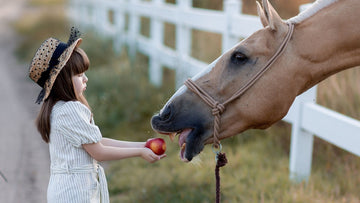 As the change in seasons brings a welcomed drop in temperatures, beautiful foliage, and favorite holidays, it’s time to reconsider horses’ feeding programs. Senior horses may need special attention as the colder weather makes everything a little more difficult, and a bred broodmare might need extra concentrate, such as grain, to fulfill her dietary requirements.
As the change in seasons brings a welcomed drop in temperatures, beautiful foliage, and favorite holidays, it’s time to reconsider horses’ feeding programs. Senior horses may need special attention as the colder weather makes everything a little more difficult, and a bred broodmare might need extra concentrate, such as grain, to fulfill her dietary requirements.
With thoughtful planning and diligent adjustments, the transition from summer to fall feeding can be an uninterrupted affair.
Watch for colic
According to Horse & Rider writer Eleanor Kellon, VMD, spring, and fall pasture grass contains more simple carbohydrates than grass in the summer and winter and can put horses at risk for colic. This is because grass grows rapidly in the spring and fall due to the rainfall, and is more immature. The fresh, new grass is higher in simple carbohydrates, which turn to sugar in the digestive tract.
In comparison, hay and more mature grass are higher in complex carbohydrates that provide more fibrous, balanced digestion. Horse & Rider writer Kristen Janicki, MS, PAS says the young grass’s sugars could spike insulin, causing digestive upset or laminitis.
When it comes to acclimating a horse to a fall pasture, gradually build up turnout time over several weeks and feed hay their body is accustomed to.
Adding grain
Grain is an excellent tool for filling in missing minerals and nutrients. Grain can behave like a body condition builder but should be added to the diet in stages to let the horses’ fermentative gut adjust. According to Horse & Rider, no more than four pounds of grain should be fed at a time.
Adding hay
Hay is the savior of fall feeding. The heat it produces while being broken down in the digestive tract keeps horses warm, and its fibrous nature can help balance the rich fall pastures.
Hay quality is dependent on plant maturity. When selecting hay, look for a high leaf-to-stem ratio, smaller stem size, freshness, good color with minimal sun bleaching, and absence of weeds.
Changing hay
If you’re changing from one batch of hay to another, replace 10-25% of the older hay with the new hay, upping the ratio of new hay every three days until you’re feeding entirely new hay.
Watching water
As temperatures cool, horses often stop drinking as much water. The reduction of water consumption can lend itself to colic, so keeping clean, ice-free water available to your horse at all times is vital. There are several trough insulation tutorials available on the internet, and you can outfit your trough with caged heaters or insulation. To encourage a horse to drink, you can add an electrolyte supplement to grain or give it as an oral paste.
Consider supplements
Supplements like powdered electrolytes can aid your horse in its fall transition. If maintaining body condition throughout the fall is a concern, oil in the grain can get your horse extra calories. Supplements such as pelleted dewormers and loose mineralized salt can also benefit horses as the seasons change. Consult with your veterinarian for specific feeding and health concerns.
Transitioning to fall feeding is a straightforward process that once implemented, can make both you and your horses more comfortable.






















